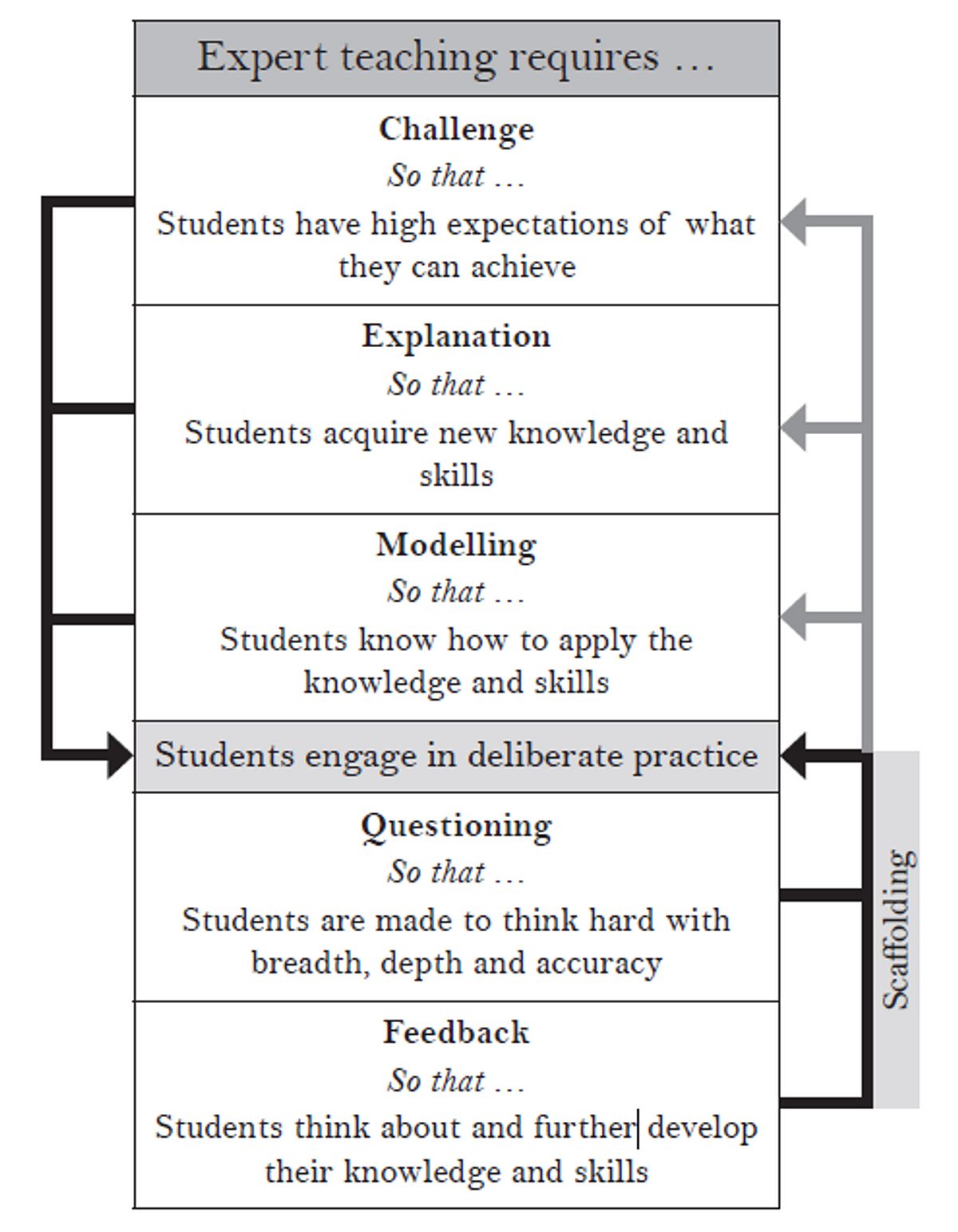
Research School Network: Focusing in on challenge Deb Friis explores ‘challenge’ – one of the six principles from ‘Making every lesson count’.
—
Focusing in on challenge
Deb Friis explores ‘challenge’ – one of the six principles from ‘Making every lesson count’.
Share on:

by Durrington Research School
on the
As it is the start of a new school year we at Durrington are renewing our focus on the “six principles” of great teaching as outlined below:
This post will focus on the first of these strategies, challenge, by summarising the chapter on Challenge from “Making Every Lesson Count” by Shaun Allison and Andy Tharby.
Challenge is often presented in terms of challenging the most able, and yet actually we should be thinking in terms of providing optimal challenge for all students. Rosenthal and Jacobson’s 1960s research into “the Pygmalion effect” suggested that our expectations of students, be they high or low, can be hugely influential and affect both our interactions with them and their future achievement. We need to raise the bar, then, and support all students have high expectations and aspirations and believe they can do it and we must make sure we do not put artificial caps on their learning.
All students are likely to learn the most when they struggle just outside their comfort zone, but not so much that they reach their panic zone. We want to move students to a place where they embrace this productive struggle, and this will require hard work, resilience and determination. In order to do this there are a number of strategies that we as teachers can employ to help. These are briefly outlined below.
1. Make learning objectives single and challenging
Rather than use “All, Most, Some” objectives or tasks where students have to choose their own starting point, use a single, challenging learning objective and be prepared to support students to make progress towards this, or even exceed it. This helps to avoid students settling for doing just enough and keeps expectations high for all.
2. Scale up
Dip into the key stage just above the one you are teaching so that students are being exposed to topics outside their current course requirements. You are aiming to inspire rather than overwhelm though so present material in simple, manageable steps.
3. Know thy subject
Do not neglect your own subject knowledge and make sure that you can perform to the highest standard required for your phase. Aim to read around your subject and keep up with new developments – it could help to share this with colleagues. Be mindful that if “memory is the residue of thought” as Daniel Willingham (2009) says, then you want students to be thinking hard about your subject (such as fractions), not the peripheral aspects of the lesson (such as we cut up a bar of chocolate).
4. Share excellence
Show off excellence in your subject and around the school by having it on display.
5. Unstick them
Although struggle is important, make sure that students are “unstuck” before they can give up and get disheartened. Difficult content must not be ploughed on with regardless, but small adjustments must be continually made to make sure content is learned securely.
6. Layer their writing
Make redrafting a habit. Rather than accepting the first attempt at a piece of work, train students in the process of redrafting and allow them to work on and correct their mistakes. Redrafting grids can be a useful resource in supporting students to do this.
7. Benchmark brilliance
Consider setting a task that will take all students beyond what they thought they were capable of. This will need to be structured carefully – use the Scale Up strategy to decide upon a level. Make sure students are aware of what excellence looks like and deconstruct this together. Use scaffolds and small steps to help them along the way as well as worked examples. Insist on proofreading and redrafting of their work. Finally celebrate success and display the work in such a way that reminds each student what they are capable of.
8. The long haul
Challenge can not just be considered in terms of individual lessons. Students need to be invested for the long haul and have their long term goals in mind. It can be useful to get students to explicitly consider these at the start of a course, to keep referring forward to them, and to regularly ask students to reflect on their own performance.
9. Direct challenge
Ask specific questions that will help to move a student on in their learning, the phrase “Now try…” may be useful for this.
10. Read for breadth
Provide opportunities for students to read around above and beyond your subject as it is taught in the classroom. This could be via subject-specific books in the library, having journals or magazines to hand in the classroom, or though a class blog. Extended reading can be useful in all subjects, not just English.
11. Frame the challenge
Be aware of the language that we use with our students. We want to encourage hard work, determination and perseverance and dispel the myths that some people are “just naturally good at [insert subject here]”. “If you’re not struggling, you’re not learning” can be a good reminder.
Deb Friis
Deb is a maths teacher at Durrington High School. She is also a Maths Research Associate for Durrington Research School and Sussex Maths Hub Secondary Co-Lead and will be delivering our training on the EEF Guidelines for KS2 and 3 Maths.
More from the Durrington Research School
Show all news

The Evidence Base behind Attendance Interventions
The importance of attendance means that there is a growing demand for a review of the research into attendance interventions.

Metacognition and self-regulation in geography
Head of geography Sam Atkins explains how he has been helping students develop their metacognitive regulation .
